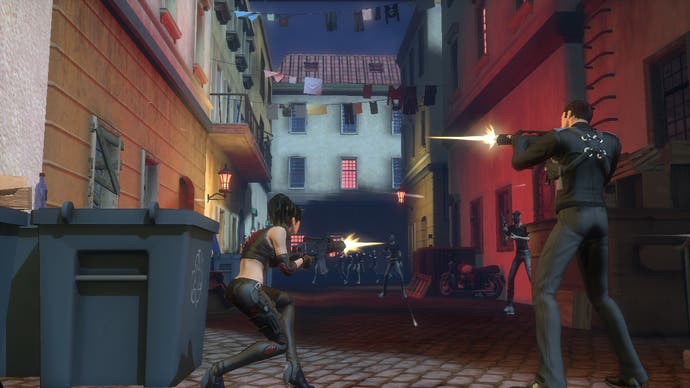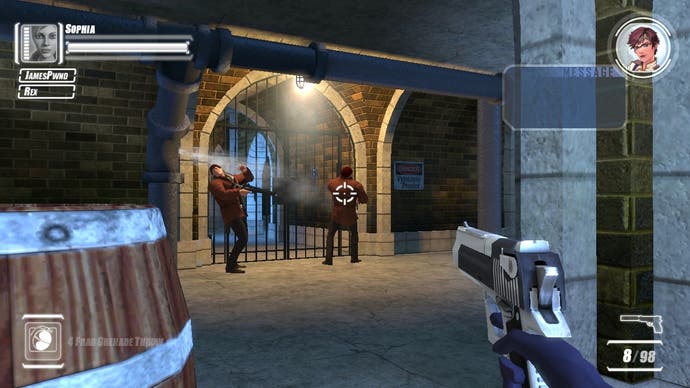The Agency
An agent of change.
As we sit and discuss The Agency with lead designer Hal Milton in the discreet offices of Sony Online Entertainment's Seattle studio, he hits upon a definition of what MMO games should deliver that's quite brilliant in its simplicity. We might have been talking about any number of the innovative, open-ended features of the espionage-themed massively multiplayer shooter when he nails it: the collectible operatives who play the game when you don't, the role system that's assigned to gear rather than characters, the multiple character progression threads, the encounters that scale to either solo or group play, the alias system of disguises - to be honest, we can't remember which.
"It's just having fun in a world that keeps going," Milton says simply. "I mean, really, it's not that hard. It's just that everybody tends to..." But there he stops himself short of laying into the competition. "Oh, anyway, I'm not going to go off on a rant."
Ranting, though, is nearly all Milton does for a solid eighty minutes, fuelled by an enormous cup of coffee, nicotine withdrawal, a brain overflowing with ideas and raw enthusiasm for the game he's making. Enthusiasm that, having seen a demo and talked it over with Milton and development director Matt Wilson, it's very easy to share. The Agency is unquestionably one of the most appealing and cleverly conceived prospects in online gaming right now, and if it fulfils its promise, it could be very big news indeed.
We covered the basics in our interview with designer and writer Matt Staroscik some months ago: The Agency is in development for PS3 and PC, and is a story-led co-operative spy shooter set in a persistent, massively multiplayer world, with a light-hearted take on the Bond and Bourne clichés.

"There's so much beautiful stuff in Bond I can't even express," says Milton. "And we've been pulling from just about every reference we can - that's actually an important note about our game. EverQuest was the grab-bag of fantasy cliché. That's really the approach we want to take with The Agency - we're a grab-bag for espionage and action fun. We're not just borrowing from Fleming or Le Carré, but we're also looking at - I mean, for God's sake, the A-Team! That actually informs team dynamics and character dynamics for Paragon." Paragon is one of the game's two rival (but not actually opposed) factions, the rough-and-ready mercenaries to UNITE's high-tech super-spies.
Running us through character creation, Milton shows off the distinct visual signatures of Paragon and UNITE, and the versatility and wry style of the game's superb character art. Though not as sharply stylised as Battlefield Heroes or Team Fortress 2, the game's lightly cartooned look allows for character with tremendous variation and charisma and a certain tongue-in-cheek exuberance; self-expression through character creation, one of the key draws of persistent online gaming, is clearly not going to be a problem. Pointing out a male Paragon merc with overdeveloped pectorals, Milton notes that "breast physics are not just for women" in The Agency's world.
As with other MMOs, the visual signature of your class or group role will be in your outfit, but unlike those games, changing that role will be as simple as changing that outfit. There's no particular benefit in character specialisation, and Milton wants players to be able to enjoy everything The Agency has to offer by starting just two characters - one UNITE, and one Paragon.

The group roles are divided into three archetypes - combat, stealth, and support - with each of these offering a choice of two provisionally-named roles, although more will be added later. On the combat side, the tactical specialist is a front-line force who takes and deals damage, and is expert at breaching and creating cover - there are dynamic cover opportunities such as desks to overturn, which both players and AI can make use of. The weapons specialist is similar, with a greater variety and depth of skill will weapons.
Of the stealth roles, the Spec Ops is a traditional scout who can cloak to sneak ahead, take out security and disarm bombs, with the Psy Ops specialists in manipulation of other players or AI, confusing and turning them. Supporting classes are the self-explanatory field medic, and the field tech, a role that can create perimeter defences with turrets, hack systems, and even lay down custom save checkpoints. Both support classes will be reasonably proficient at combat too, able to do their bit in the fray.


.png?width=291&height=164&fit=crop&quality=80&format=jpg&auto=webp)




.jpg?width=291&height=164&fit=crop&quality=80&format=jpg&auto=webp)
